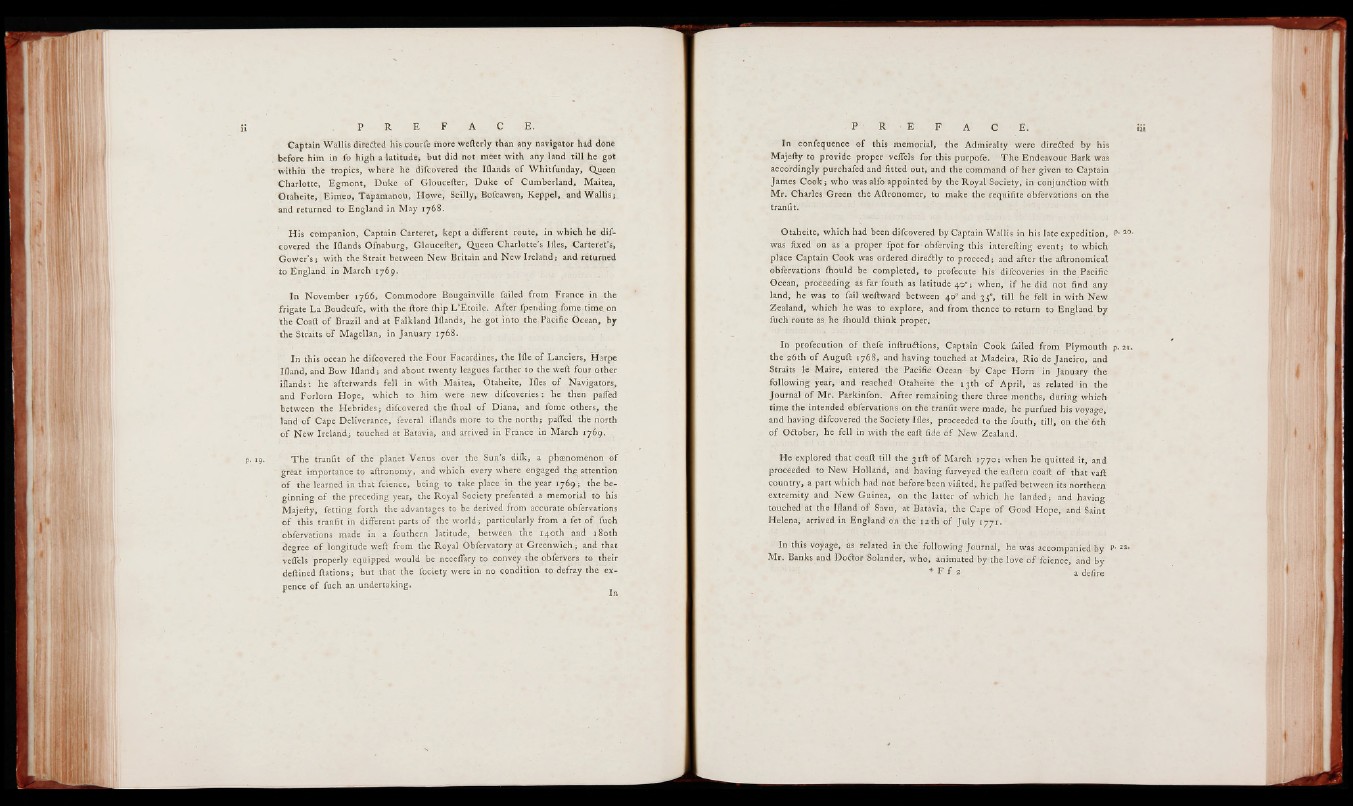
Captain Wallis dife&ëd his Courfé ffioré Wëfterïy than any navigator hàd done
before him in fo high a latitude* but did not meet with any land till he got
• within thé tropics, where hé difcovered thé IllaàcU ôf Whitiunday, Queen
Charlotte, Egmont, Duke of Gloucefter, Duke of Cumberlând, Maitea,
Otaheite, Eimeo, Tapâmanùli, Howe, Scilly* Bofcawen, Keppel, and Wallis;
and returned to England in May 1768.
His companion, Captain Carteret, kept a different route, in which he difi-
covered the Iflands Oihaburg, Gloucefter, Queen Charlotte’s Iiles, -Carteret’s,
Gower’s; with the Strait between New Britain and New Irelahd,- and returned
to Éngland in March 1769.
In November 1766, Commodore Bougainville failed from France in the
frigate La BoudeUfe, with the ftoté Îhip L ’Etoile. After {pending fome time, on
the Coaft of Brazil and at Falkland Iflands, he got into the Pacific Ocean, by
the Straits t>f Magellan, in January 1768.
In this ocean he difcovered the Four Facardines, the Ifle of Lanciers, Harpe
Iilarid, and Bow Iflarid; and about twenty leagues farther to the Weft four other
iflandsï he aftetwatds fell in with Maitea, Otaheite, Ifles of Navigators,
and Forlorn Hope, which to him were new difcoveries : he then pafled
between the Hebrides; difcovered the Îhoal o f Diana, and fome others, the
land of Cape Deliverance, feveràl iflands more to the north; paffed thfe north
of New Ireland; touched at Batavia, and arrived in Frânce in March 1769.
p. 19. The tranfit of the planet Venus over the Sun’s diÎk, a phænomènon of
' great importance to aftronomy, and which every where engaged the attention
of the learned in that fcience, being to take place in the year 1769 ; the beginning
of the preceding year, the Royal Society presented a memorial tb his
Majefty, fetting forth the advantages to be derived from accurate obfervations
o f this tranfit in different parts of the world; particularly from à fet of fuc-h
obfervations made in a fouthern latitude, between the 140th and 180th
degree of longitude weft from the Royal Ôbfervatory at Greenwich; and that
veffels properly equipped would be neceflary to convey the obfervers to their
deftined ftations; but that the fociety were in no condition to defray the expence
of fuch an undertaking.
* Tn
In confequenee o f this memorial, the Admiralty were diredted by his
Majefty to provide proper veflels for this purpofe. The Endeavour Bark was
accordingly purchafed and fitted out, and the command of her given to Captain
James Cook1; who was alfo appointed by the Royal Society, in conjunction with
Mr. Charles Green the Aftronomer, to make the requifite obfervations on the
tranlif,
Otaheite, which had been difcovered by Captain Wallis in his late expedition, P-
was fixed on as a proper fpot for1 obferving this interefting event; to which
place Captain Cook was ordered diredtly to proceed; and after the aftronomical
obfervations fhould be completed, to profecute his difcoveries' in the Pacific
Ocean, proceeding as far fouth as latitude 40’ ; when, if he did not find any
land, he was to fail weftward between 40" and 35% till he fell in with New
Zealand, which he was to explore, and from thence to return to England by
fuch route as he fhould think proper.
In profecution of thefe inftrudtions, Captain Cook failed from Plymouth p.
the 26th of Auguft 1768, and having touched at Madeira, Rio’de Janeiro, and
Straits le Maîré, entered the Pacific Ocean by Cape Horn in January the
following year, and reached Otaheite the 13th of April, as related in the
Journal of Mr. Parkinfon. After remaining there three months, during which
time the intended obfervations on the tFanfit were made, he purfued his voyagé,
and having difcovered the Society Ifles, proceeded to the fouth, till, on the'6th
of Odtober, he fell in with the eaft fide of New Zealand.
He explored that coaft till the 31ft of March 1770; when he quitted it, and
proceeded to New Holland, and having furveycd the eaftern coaft of that vaft
country, a part which had not before been vifited, he pafled between its northern
extremity and New Guinea, on the latter of which he landed; and having,
touched at the Iiland of Savu, at Batàvia, the Cape of Good Hope, and Saint
Helena, arrived in England on the 12 th of July 1771.
In this voyage, as related in the following Journal, he was accompanied by P'
Mr. Banks and Dotftor Soi'ander, who, animated by-the love o f fcience, and by
* F f 2 a defire